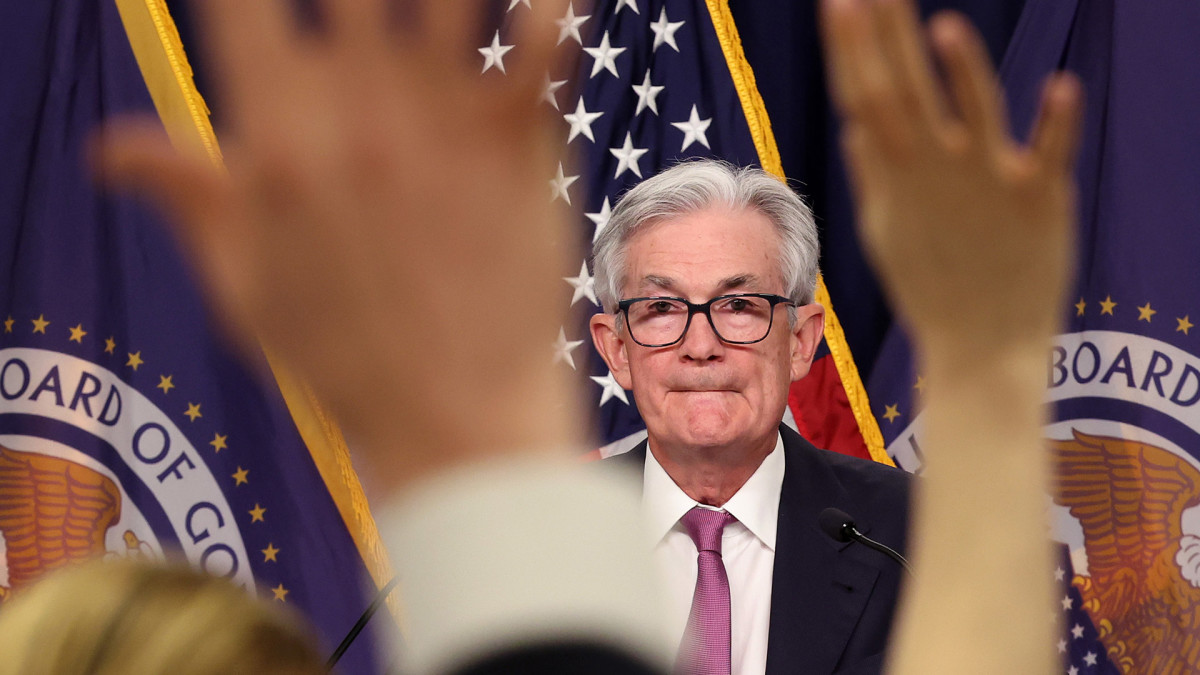
It may be too much to say the week coming up is the mother of all weeks for investors and markets. But it has the potential to be dramatic.
It comes after the 10-year Treasury yield briefly topped 5% on Oct. 23 but ended the week at 4.84%. Yields at these levels haven't been seen since mid-2007. Stocks were volatile, to say the least. The Dow Jones industrials (^DJI) -) and (^IN) -) were off four days out of five.
And the Dow, S&P 500 and Nasdaq Composite (^COMPX) -) indexes fell more than 2% for the week. All appear headed for a third straight month of declines, something that hasn't happened since the Covid-19 pandemic erupted in early 2020.
But at least oil prices were lower on the week and have fallen 5% or so in October, despite rising Middle East tensions. U.S. gasoline prices are off nearly 10% since their mid-September peak and are 6.2% lower than a year ago.
The Fed's rate decision, due Wednesday, is the biggest of the week's economic events. But there is also the matter of the Labor Department's monthly jobs report due before markets open on Friday.
In addition, there will be reports during the week on manufacturing activity and factory orders and the weekly look at jobless claims.
To top all that off are more than 1,100 earnings reports due during the week, including the biggest — from Apple (AAPL) -) — coming after the Nov. 2 close.
Maybe the Fed won't raise rates
The Fed will announce Nov. 1 whether it will raise its key federal funds rate from the current range of 5.25% to 5.5%.
The answer may be "No" if CME Group's Fed Watch tool is accurate, Wall Street fully expects the central bank to leave the rate where it is. Moreover, the tool, which tracks the projections of economists and analysts, suggests the rate will stay at 5.25% to 5.5% at its Dec. 12-13 meeting. The Fed had suggested one last rate increase might come this year.
Investors would be stunned and would sell heavily if the Fed raised rates on Wednesday or at its December meeting. The betting now is the Fed is basically done raising rates, letting residual effects of rate increases since early 2022 and the bond market kill off the inflation pressures that erupted after the easing of the Covid-19 pandemic and its ultra low interest rates.
That is, of course, if Chairman Jerome Powell is right and is careful in his answers in the news conference he will hold after the Fed announcement.
The soft-spoken Powell has been chairman since 2018 and has been keyed on inflation pressures since the pandemic eased. He has hinted that rates may be high enough to help inflation ease back to the Fed's goal of 2% a year.
Related: Cathie Wood and Elon Musk are taking notice of a disturbing new trend
That said, the Fed and other central banks have been loudly criticized for some time because they were slow at reacting to the inflation threat. And central banks don't have a great forecasting record, as Jamie Dimon bellowed this past week.
The JPMorgan (JPM) -) CEO noted in a Saudi Arabia speech that central banks were caught flat-footed by the inflation surge and then by the stubborn strength of the U.S. jobs market. Central banks missed the vulnerabilities created by the early-2000s housing boom.
So, consider Dimon's remarks a warning and/or plea that the Fed get this decision right.
A steady jobs market, weak housing market
The jobs report, according to the consensus estimate, is expected to show a gain of 186,000 jobs, down from 336,000 in September. The unemployment rate should hold steady at 3.8%.
It may show the slowdown effects resulting from the United Auto Workers' strike against U.S. auto manufacturers — but not the potential effects of contract deals announced this past week by the union and Ford Motor Co. (F) -) and Chrysler-parent Stellantis (STLA) -). General Motors (GM) -) and the UAW are still negotiating.
The Fed's campaign has exacerbated the problems of empty office space in many real estate market and boosted worries that the vacancies could pressure the financial sector.
The Fed is having a powerful effect on the nation's residential real estate market. Sales are off some 35% since the end of 2021. Rising mortgage rates have made home purchases difficult. And the supply of homes for sale has dwindled because many homeowners with low-rate mortgages can't afford to sell.
The combination has a broad effect across the economy, as JPMorgan economist David Kelly noted recently. Home purchases, whether new or existing, usually generate a high-volume of appliance, furniture and other spending.
And some states, such as Florida, Texas and Arizona, depend on high volumes of real estate activity to fuel their economies.
Why Apple's report is important
Apple's report will be the most closely perused stock of the week, maybe the entire fall earnings season. It has the biggest market cap of any stock, about $2.63 trillion as of Oct. 27.
That's the rub. On July 31, Apple's market cap was $3.06 trillion. The 14.1% decline since then is the product of worries about growth and whether the new iPhone will be a winner.
Apple is not alone. It's part of a group of stocks known popularly as the Magnificent Seven that represent roughly 25% of the market value of the S&P 500. The others are Microsoft (MSFT) -), Amazon (AMZN) -), Google-parent Alphabet (GOOG) -), chip-giant Nvidia (NVDA) -), Facebook parent Meta Platforms (META) -) and Tesla (TSLA) -).
But third-quarter results have failed to excite many investors. Including Apple and Tesla, the group has lost $1.24 trillion in market value since the market's most recent peak at the end of July, according to Marketwatch.
The Nasdaq-100 Index (^NDX) -), which is dominated by the group, is off 10.5% from its July 18 closing high and 11% from its 52-week intraday high a day later.
In addition to Apple, some of the biggest stocks to report in the week ahead include:
Tuesday
Dow component and pharma giant Pfizer (PFE) -)
Chrysler-owner Stellantis (STLA) -)
Casino giant Caesar's Entertainment (CZR) -)
Wednesday
Chipmaker QUALCOMM (QCOM) -)
Online vacation rental company Airbnb (ABNB) -)
Fast-food giant Yum! Brands (YUM) -)
Oil and gas producer APA (APA) -)
Thursday
Pharmaceutical company Eli Lilly (LLY) -)
Travel company Booking (BKNG) -)
Footwear-maker Crocs (CROX) -)
Friday
Berkshire Hathaway (BRK.B) -)
Tech marketing giant Gartner (IT) -)
Futures systems operator CBOE Global Markets (CBOE) -)







